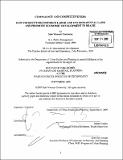Compliance and competitiveness : how prosecutors enforce labor and environmental laws and promote economic development in Brazil
Author(s)
Coslovsky, Salo Vinocur
DownloadFull printable version (12.21Mb)
Alternative title
How prosecutors enforce labor and environmental laws and promote economic development in Brazil
Other Contributors
Massachusetts Institute of Technology. Dept. of Urban Studies and Planning.
Advisor
Judith Tendler.
Terms of use
Metadata
Show full item recordAbstract
This dissertation bridges the fields of international development, legal sociology, and organizational behavior to examine how Brazilian prosecutors enforce labor and environmental laws. Typically, the enforcement of protective regulations produces a range of outcomes. In some cases enforcers create major hurdles for business growth. In others, they overlook blatant violations and fail those interests they were supposed to protect. Yet, in some instances, enforcement agents find ways to reconcile compliance with competitiveness. What explains this variation? Why do these agents sometimes deepen existing conflicts and grant (temporary) victories to one of the parties, but in other occasions they engineer positive-sum outcomes? To answer this question I spent 18 months in the field and immersed myself in the life of the Brazilian procuracy. I interviewed more than 50 prosecutors, attended internal proceedings, and accompanied them as they attempted to enforce protective regulations. I also interviewed more than 100 representatives from government agencies, NGOs, industry associations, private firms, and labor unions from a cross-section of sectors in which actors struggled over the enforcement of labor and environmental laws. Eventually, I discovered that outcomes depended on prosecutors realizing that compliance requires costly and risky changes in business practices. Rather than prosecute, which they anticipate will eliminate jobs and undermine business profitability, or clarify the law, which they fear will be futile, these prosecutors reach out and assemble a network of institutions willing to cover some of the costs and insure some of the risks associated with compliance. (cont.) They lead an effort of inter-institutional root-cause analysis and joint-problem solving, and through this method they strive to make compliance the easiest choice for all involved. This study goes beyond showing that compliance can be reconciled with competitiveness. Rather, it hopes to redirect the attention of development experts away from pre-set ingredients, recipes, and best-practices and towards the organizational behavior of those front-line regulators who are out in the field, using their discretion to reshape businesses practices along more equitable and sustainable lines. These agents are the long arm of the state and their aggregate action can constitute the industrial policy of the 21 st century.
Description
Thesis (Ph. D.)--Massachusetts Institute of Technology, Dept. of Urban Studies and Planning, 2009. Cataloged from PDF version of thesis. Includes bibliographical references (p. 178-187).
Date issued
2009Department
Massachusetts Institute of Technology. Department of Urban Studies and PlanningPublisher
Massachusetts Institute of Technology
Keywords
Urban Studies and Planning.